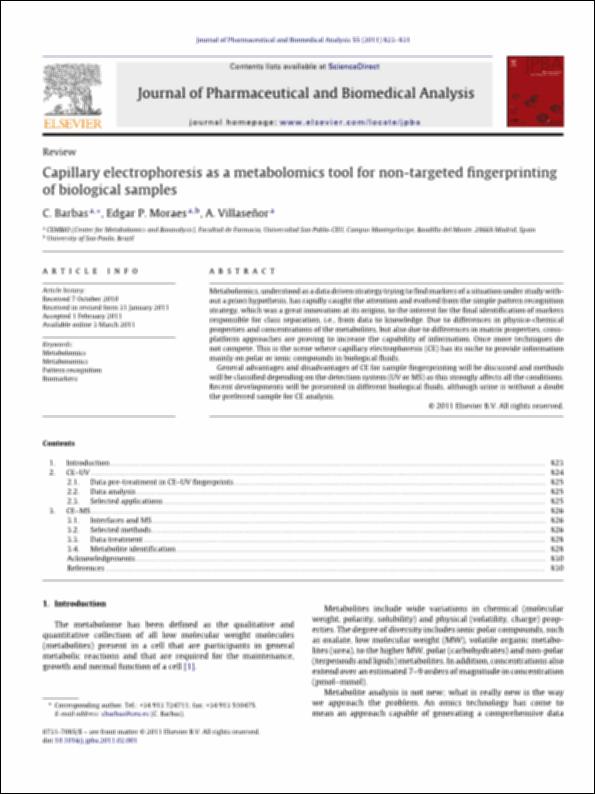Por favor, use este identificador para citar o enlazar este ítem:
http://hdl.handle.net/10637/12986Capillary electrophoresis as a metabolomics tool for non-targeted fingerprinting of biological samples.
| Título : | Capillary electrophoresis as a metabolomics tool for non-targeted fingerprinting of biological samples. |
| Autor : | Barbas Arribas, Coral. Villaseñor Solis, Alma Cristina Moraes, Edgar P. |
| Materias: | Metabolomics; Metabonomics; Pattern recognition; Biomarkers |
| Resumen : | Metabolomics, understood as a data driven strategy trying to find markers of a situation under study without a priori hypothesis, has rapidly caught the attention and evolved from the simple pattern recognition strategy, which was a great innovation at its origins, to the interest for the final identification of markers responsible for class separation, i.e., from data to knowledge. Due to differences in physico-chemical properties and concentrations of the metabolites, but also due to differences in matrix properties, crossplatform approaches are proving to increase the capability of information. Once more techniques do not compete. This is the scene where capillary electrophoresis (CE) has its niche to provide information mainly on polar or ionic compounds in biological fluids. General advantages and disadvantages of CE for sample fingerprinting will be discussed and methods will be classified depending on the detection system (UV or MS) as this strongly affects all the conditions. Recent developments will be presented in different biological fluids, although urine is without a doubt the preferred sample for CE analysis. |
| Descripción : | En: Journal of Pharmaceutical and Biomedical Analysis. ISSN 1873-264X 2011, 55, 4 : 823-831 |
| URI : | http://hdl.handle.net/10637/12986 |
| Derechos: | http://creativecommons.org/licenses/by-nc-nd/4.0/deed.es |
| Fecha de publicación : | 14-sep-2011 |
| Centro : | Universidad San Pablo-CEU |
| Aparece en las colecciones: | Facultad de Farmacia |
Los ítems de DSpace están protegidos por copyright, con todos los derechos reservados, a menos que se indique lo contrario.


